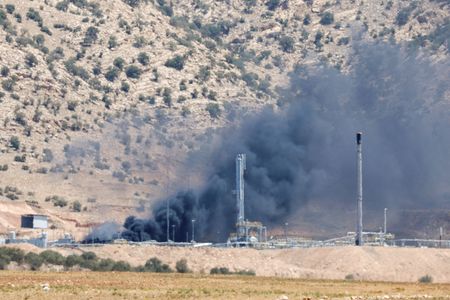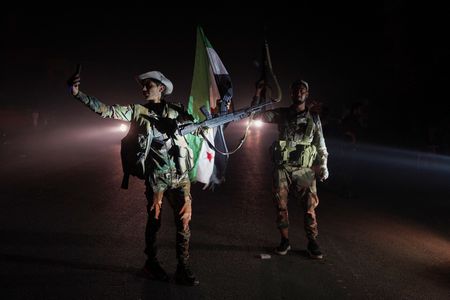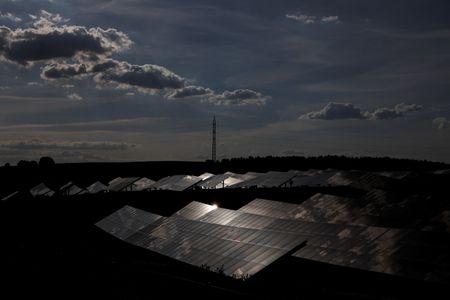By Ahmed Rasheed
BAGHDAD (Reuters) -Iraqi Kurdistan will resume oil exports through a pipeline to Turkey after a two-year halt, Iraq’s federal government said on Thursday despite a fourth day of drone attacks that have shut down half of the region’s output.
The semi-autonomous region did not confirm the export plan, but Baghdad and Erbil have been in negotiations since late February to end a stand-off that has halted flows from the north of the country to Turkey’s Mediterranean port of Ceyhan.
Baghdad said the Kurdistan Regional Government (KRG) will immediately begin delivering at least 230,000 barrels per day (bpd) to state oil marketer SOMO for export under a new agreement approved by the federal cabinet.
The drone attacks on Iraqi Kurdistan’s oilfields continued on Thursday, with officials pointing to Iran-backed militias as the likely source of attacks.
They are the first such attacks on oilfields in the region and coincide with the first attacks in seven months on shipping in the Red Sea by Iran-aligned Houthi militants in Yemen.
Thursday’s strike hit an oilfield operated by Norway’s DNO in Tawke, the region’s counter-terrorism service said.
It was the week’s second strike on a site operated by DNO, which operates the Tawke and Peshkabour oilfields in the Zakho area that borders Turkey.
No group has claimed responsibility for four consecutive days of attacks, but security officials told Reuters the drones came from areas controlled by Iran-backed militias.
No casualties have been reported, but oil output in the region has been cut by 140,000 bpd to 150,000 bpd, two energy officials said.
AWAITING FINANCIAL DETAILS
A statement from KRG Prime Minister Masrour Barzani said the government had approved a joint understanding with the federal government and it was awaiting financial details.
Similar agreements in the past failed to secure a resumption in exports and it remains unclear if this deal will succeed.
Oil producers working in Kurdistan, including DNO, Genel Energy, Gulf Keystone Petroleum and Shamaran Petroleum, did not respond immediately to requests for comment.
They have previously demanded that their production-sharing contracts should remain unchanged and their debts of nearly $1 billion be settled under any agreement.
The KRG was producing about 435,000 bpd before the pipeline closure in March 2023.
The United States has been pressuring both sides to reach a deal to resume exports.
Iran backs militant groups that are part of the Islamic Resistance in Iraq, a collection of about 10 hardline Shi’ite armed factions that command about 50,000 fighters and arsenals.
They have claimed responsibility for dozens of missile and drone attacks on Israel and U.S. forces in Iraq and Syria since the Gaza war erupted in 2023.
United States-based Hunt Oil operates the Ain Sifni oilfield in the Dohuk region, which was attacked on Wednesday. Hunt Oil said no workers were injured but it had to shut down its facilities to assess damage.
(Reporting by Ahmed RasheedAdditional reporting by Enes TangurWriting by Ahmed Elimam and Ahmad GhaddarEditing by Barbara Lewis, Sharon Singleton, Jason Neely and David Goodman)









